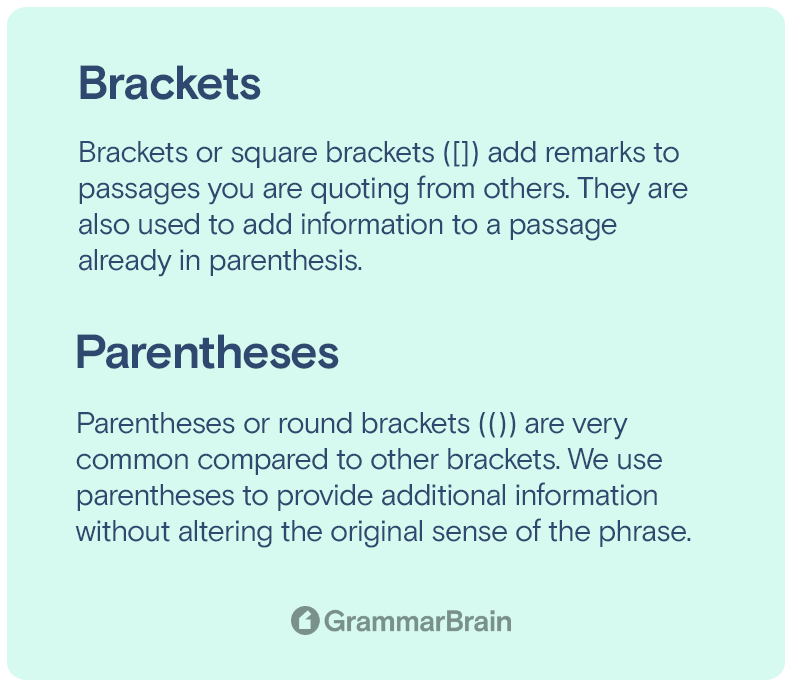You must have come across these two words: “brackets” and “parentheses.” Though very common, the difference between them can be challenging to understand. It’s not always clear where and under what circumstances we must use these two words.
To have flawless English writing skills, we must understand the meaning and use of these words. Let us look at the various aspects related to brackets and parentheses.
| Punctuation | Definition |
| Bracket | A bracket is either of two tall fore- or back-facing punctuation marks commonly used to isolate a segment of text or data from its surroundings. |
| Parenthesis | In rhetoric, a parenthesis or parenthetical phrase is an explanatory or qualifying word, clause, or sentence inserted into a passage. The parenthesis could be left out and still form grammatically correct text. Parenthetical expressions are usually delimited by round or square brackets, dashes, or commas. |
What are brackets and parentheses?
Both brackets and parentheses are punctuation marks. They come under the brackets category and are used to insert comments or additional information within sentences. However, they have substantially different purposes.
It is necessary to have both an opening and a closing bracket – brackets and parentheses are always used in pairs. They may enclose a single word, a phrase, or an entire sentence.

Brackets:
Brackets or square brackets ([]) add remarks to passages you are quoting from others. They are also used to add information to a passage already in parenthesis.
Examples:
- Frank said, “He [Michael] wants to visit Paris.”
- We had a great time [in the summer camp].
- I need to move all my belongings (including furniture, showpieces, dresses [formal], and books) to my new apartment.
In the first and second sentences, we used square brackets to add our remarks to the sentences. We provided extra information within parentheses using square brackets in the third sentence.
Parentheses:
Parentheses or round brackets (()) are very common compared to other brackets. We use parentheses to provide additional information without altering the original sense of the phrase.
Examples:
- You need to have a balanced diet daily (protein, carbs, vitamins, et cetera) to live a healthy life.
- The old coffee shop (on the 4th street) is comparatively better than the new ones.
- George R. R. Martin (the author of A Song of Ice and Fire) claimed Daemon Targaryen to be the most greyest characters in the history of Westeros.
In all three sentences above, we used parentheses to provide additional information without entirely changing the meaning of the sentences.
Tips to use () and []
Use Parentheses to add second thought
- He ate a wholesome (not that healthy) burger.
- Our society judges people on the basis of their clothing (which is very disgraceful, by the way).
Use Parentheses to represent time zones/area codes
- The meeting is scheduled at 7:00 PM (GMT).
- I belong to Sacramento, California (98532).
Use Parentheses to add items in a list
- You need to buy (a) curd, (b) butter, (c) bread, and (d) vegetables.
Use Brackets to indicate your own remarks
- The Mayor [Mr. Johnson] announced an emergency.
- Robin [Shawn’s ex-wife] pressed charges against him.
Use Brackets to quote sources
- Justice is the first virtue of social institutions, as truth is of systems of thought. [A theory of Justice, 1971].
- For once on the face of the Earth, let’s not speak in any language, stop for one second, and not move our arms so much. [Keeping Quiet, Pablo Neruda]
Wrapping it up
Parentheses () should never be confused with brackets []. Learning to punctuate correctly makes writing more comfortable. Always remember:
- Words under parentheses add supplement information to the central passage.
- Words under brackets quote comments or provide extra information within parentheses.
Inside this article
Fact checked:
Content is rigorously reviewed by a team of qualified and experienced fact checkers. Fact checkers review articles for factual accuracy, relevance, and timeliness. Learn more.
Core lessons
Glossary
- Abstract Noun
- Accusative Case
- Anecdote
- Antonym
- Active Sentence
- Adverb
- Adjective
- Allegory
- Alliteration
- Adjective Clause
- Adjective Phrase
- Ampersand
- Anastrophe
- Adverbial Clause
- Appositive Phrase
- Clause
- Compound Adjective
- Complex Sentence
- Compound Words
- Compound Predicate
- Common Noun
- Comparative Adjective
- Comparative and Superlative
- Compound Noun
- Compound Subject
- Compound Sentence
- Copular Verb
- Collective Noun
- Colloquialism
- Conciseness
- Consonance
- Conditional
- Concrete Noun
- Conjunction
- Conjugation
- Conditional Sentence
- Comma Splice
- Correlative Conjunction
- Coordinating Conjunction
- Coordinate Adjective
- Cumulative Adjective
- Dative Case
- Determiner
- Declarative Sentence
- Declarative Statement
- Direct Object Pronoun
- Direct Object
- Diction
- Diphthong
- Dangling Modifier
- Demonstrative Pronoun
- Demonstrative Adjective
- Direct Characterization
- Definite Article
- Doublespeak
- False Dilemma Fallacy
- Future Perfect Progressive
- Future Simple
- Future Perfect Continuous
- Future Perfect
- First Conditional
- Irregular Adjective
- Irregular Verb
- Imperative Sentence
- Indefinite Article
- Intransitive Verb
- Introductory Phrase
- Indefinite Pronoun
- Indirect Characterization
- Interrogative Sentence
- Intensive Pronoun
- Inanimate Object
- Indefinite Tense
- Infinitive Phrase
- Interjection
- Intensifier
- Infinitive
- Indicative Mood
- Participle
- Parallelism
- Prepositional Phrase
- Past Simple Tense
- Past Continuous Tense
- Past Perfect Tense
- Past Progressive Tense
- Present Simple Tense
- Present Perfect Tense
- Personal Pronoun
- Personification
- Persuasive Writing
- Parallel Structure
- Phrasal Verb
- Predicate Adjective
- Predicate Nominative
- Phonetic Language
- Plural Noun
- Punctuation
- Punctuation Marks
- Preposition
- Preposition of Place
- Parts of Speech
- Possessive Adjective
- Possessive Determiner
- Possessive Case
- Possessive Noun
- Proper Adjective
- Proper Noun
- Present Participle
- Prefix
- Predicate



